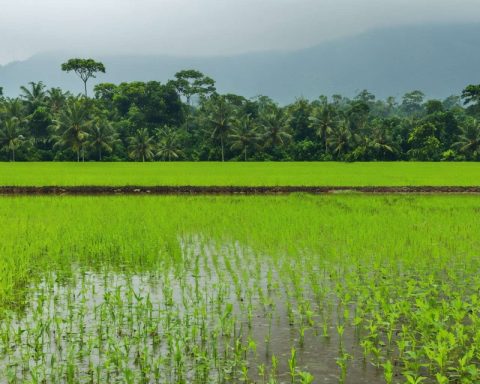- Indonesia joins the New Development Bank under the BRICS framework, enhancing its global influence and access to diversified funding sources.
- The membership aims to support Indonesia’s transition to renewable energy, leveraging solar and wind resources to reduce fossil fuel dependence.
- The NDB offers low-interest, favorable loans tailored for green growth, adding a new financial dimension beyond traditional partners like the World Bank and ADB.
- Indonesia intends to play a significant role in advocating for inclusive and environmentally aware financing models in the global sustainable development finance sector.
- Vigilance and transparency in spending are essential to ensure environmental protection and adherence to rigorous standards.
- By engaging strategically with the NDB, Indonesia aims to lead in crafting global sustainable finance policies and fostering climate-conscious initiatives.
A bold decision from the vibrant heart of Southeast Asia—Indonesia has announced its entry into the New Development Bank (NDB) orbit, under the expansive umbrella of the BRICS framework. This could thrust Indonesia onto the global stage as it races towards a greener future while reaping the benefits of diversified funding sources.
Indonesia, a land endowed with sprawling rainforests and teeming biodiversity, stands at a crucial juncture. It aims to carve out a future less dependent on fossil fuels, aspiring instead to harness the sun’s brilliance and the earth’s wind for its energy needs. The promise held by the NDB offers more than just funding; it provides a partnership aligned with these national ambitions. Picture this: sprawling solar expanses and serene wind farms, bolstered by NDB’s financial lifeblood, driving an economic engine that runs cleaner and greener.
The Southeast Asian archipelago has already established ambitious blueprints for reducing carbon emissions and expanding its renewable energy footprint. However, the transition’s sheer financial enormity has been daunting. Traditional partners like the World Bank and the Asian Development Bank (ADB) have long stood as pillars, yet the NDB introduces a new complexion to the financial landscape—one potentially painted with low-interest, favorable loans tailor-fit for green industrial growth.
Imagine Indonesia with the finesse to craft its financial narrative, leveraging this newfound membership to sway decisions and secure financing that embodies the island nation’s priorities. By playing this strategic game on the global field, Indonesia seizes an opportunity to eschew overreliance on any single financial source while sculpting terms that address both economic and environmental exigencies.
Perhaps most promising is Indonesia’s enhanced role in sustainable development finance’s evolving tapestry. NDB’s governance, where consensus rules the roost, gives Indonesia a voice—a resonant one—where it can advocate tenaciously for financing models that are inclusive and environmentally aware. It is here, amid the clamor of emerging economies, that Indonesia can champion equitable access to green financing, ensuring that developing nations do not find themselves sidelined.
Membership in the NDB isn’t just about funding—it’s about influence. Indonesia stands on the precipice of shaping global sustainable finance policies, potentially guiding the bank toward prioritizing projects that protect and rejuvenate our planet. An active participant in NDB discourse, Indonesia could herald a new era where transparency, environmental integrity, and sustainable innovation govern financial flow.
But the path is not without challenges. Vigilance will be essential. Ensuring that every dime and dollar is spent safeguarding the environment and adhering to rigorous standards is paramount. By pushing for robust environmental assessments and maintaining transparency, Indonesia sets a precedent—demonstrating that economic growth needn’t sacrifice ecological wellbeing.
As Indonesia steps into the NDB, it carries the torch of sustainable finance into the global arena. From nurturing clean technology advancements to fostering alliances for climate-conscious initiatives, each step taken cements its position not just as a recipient of global environmental finance but as a leader. This isn’t just an opportunity—it’s Indonesia reshaping its legacy for future generations.
By strategically engaging with the NDB and harnessing its potential, Indonesia isn’t merely adapting to a changing world—it’s actively shaping it. The arc of its environmental policy bends toward a sustainable, economically vibrant future, with Indonesia steering confidently, and decisively, toward a horizon teeming with promise.
Can Indonesia’s Partnership with the New Development Bank Transform Its Green Future?
Understanding Indonesia’s Strategic Move into the NDB
Indonesia’s entry into the New Development Bank (NDB), under the BRICS framework, marks a pivotal step towards advancing its sustainability goals while diversifying its funding sources. This strategic alliance is designed to bolster Indonesia’s ambitions for a future fueled by sustainable energy, reducing reliance on fossil fuels, and enhancing its position in the global financial landscape.
Key Benefits and Opportunities of NDB Membership
1. Diversified Funding Sources:
– By joining the NDB, Indonesia can access diversified funding options that complement traditional financial partnerships such as the World Bank and the Asian Development Bank. These funds are expected to support infrastructure projects aligned with sustainable energy goals.
2. Favorable Loan Conditions:
– The NDB’s capacity to offer low-interest and favorable loans tailored for green industrial growth provides Indonesia with a more flexible financial narrative. This can lead to a boost in renewable energy projects, including solar and wind farms.
3. Increased Influence and Advocacy:
– Indonesia gains a stronger voice in shaping global sustainable finance policies. With NDB’s consensus-driven governance, the country can advocate for inclusive and environmentally conscious financing models benefiting developing nations.
4. Enhancement of Clean Technology:
– Through NDB participation, Indonesia is in a prime position to advance clean technology innovations, aligning technological advancements with ecological priorities.
Challenges and Considerations
– Environmental and Social Safeguards:
– Vigilance is required to ensure that all funded projects prioritize environmental standards and social protections. Robust environmental assessments are crucial for maintaining transparency and accountability.
– Economic Versus Ecological Balance:
– Striking a balance between economic growth and ecological sustainability is paramount. The challenge remains to innovate without compromising Indonesia’s rich biodiversity and natural resources.
Real-World Use Cases and Market Forecasts
– Solar and Wind Energy Expansion:
– With the financial backing of the NDB, Indonesia can expect an expansion in solar and wind energy sectors. These projects will contribute to job creation and support Indonesia’s commitment to reduce carbon emissions.
– Infrastructure Improvements:
– Investment in sustainable infrastructure, such as public transportation and smart city initiatives, can pave the way for long-term economic growth.
Pros and Cons Overview
Pros:
– Access to diversified, favorable funding.
– Enhanced geopolitical influence in sustainable finance.
– Opportunities for technological advancement and innovation in renewable energy.
Cons:
– Risk of environmental degradation if projects are not carefully managed.
– Potential for political and financial complexities in aligning with NDB governance.
Actionable Recommendations
– Engage in Transparent Governance:
– Ensure that all projects funded through NDB adhere to high standards of transparency and environmental sustainability.
– Foster Local Partnerships:
– Collaborate with local communities and businesses to ensure that development projects have local support and integration.
– Prioritize Renewable Initiatives:
– Focus on expanding solar and wind energy capacities, tapping into the country’s natural resources while reducing carbon footprints.
Conclusion
Indonesia’s strategic engagement with the New Development Bank can significantly bolster its sustainable development path, making it a potential leader in shaping global environmental finance. By leveraging NDB resources and maintaining a focus on ecological prudence, Indonesia can emerge as a formidable player in the transition towards a greener global economy.
For more insights on sustainable development, you can visit World Bank and Asian Development Bank.












